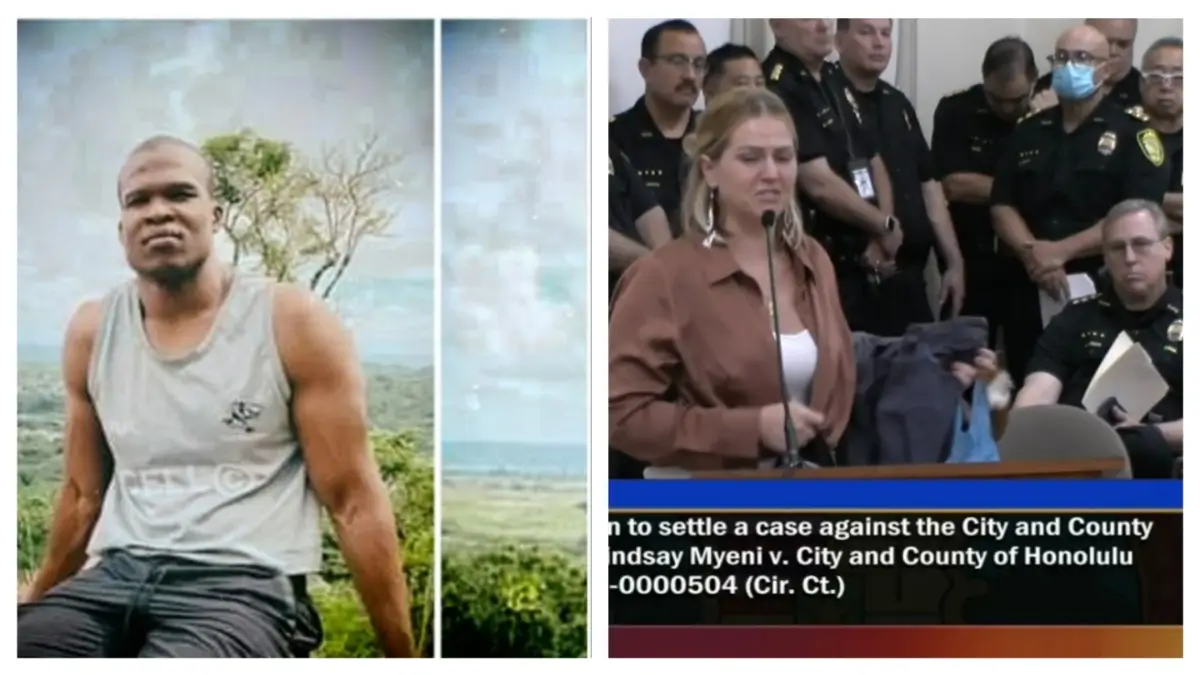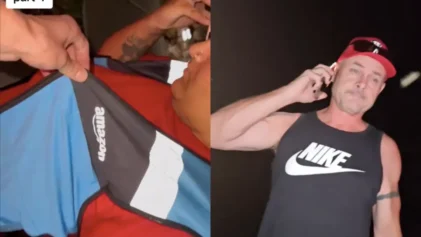The City Council of Honolulu has decided not to proceed with a $1.5 million settlement of a wrongful death lawsuit over the 2021 police killing of a former South African rugby star after strong pushback from law enforcement and city officials. The civil case will now proceed to trial.
The settlement had been approved by the city attorney and the council’s legal committee after three years of mediation and negotiations with attorneys representing the widow of Lindani Myeni, an unarmed Black man who was shot four times during a brief and violent encounter with Honolulu police responding to a 911 call about an alleged attempted burglary.

But the city council unexpectedly delayed its vote to approve the settlement last month after more than 40 armed and uniformed officers, led by the police chief, appeared in council chambers in protest, while Myeni’s widow, Lindsay Myeni, other citizens and city leaders gave emotional testimony for and against the settlement.
City Council Chair Tommy Waters then canceled a planned full council vote on the settlement last week, saying the matter should be decided in court, reported Hawaii News Now.
Waters said discussion of the case at the council’s October meeting had “escalated into what resembled a heated civil trial, with speakers presenting passionate arguments and facts from both sides. It is clear that the legal framework and procedural safeguards of the judiciary system are best equipped to handle this matter.”
Honolulu Prosecuting Attorney Steve Alm, who previously declined to charge the officers and told Council members last month that police had acted in self-defense in their shooting of Myeni, said in a statement that he was pleased the vote on the settlement was rejected.
“Settling this case would also say that the officers involved were motivated by racial prejudice,” he said. “There was zero evidence of that.”
Bridget Morgan-Bickerton, an attorney representing the Myeni family, called the overwhelming police presence at the October city council meeting a “bullying and intimidation” tactic to influence the council to change its decision to settle, reported Civilbeat.
“And it’s obvious that it did,” Myeni’s attorney Jim Bickerton told Atlanta Black Star, noting that in September the council’s legal committee had voted 8-1 to approve the settlement “following a detailed factual presentation by their own attorneys in a confidential session. No new facts emerged. The only new development was the police showing up to make clear how outraged they were that they can’t freely kill an unarmed Black man.”
The wrongful death lawsuit argues that the officers engaged in a rash, unjustified use of lethal force and that their actions were motivated by racial animus against Myeni, who is Black.
Prior to the encounter, Myeni had walked into a multi-unit Airbnb property and was told by two occupants in one unit to leave. Myeni may have mistaken the property for a similar-looking temple located next door, or another historical building, said Bickerton, noting that Myeni had a penchant for exploring historical sites in Hawaii.
A doorbell video shows Myeni casually removing his shoes prior to entering the building while wearing a traditional Zulu head covering. Conversation among the people inside is muffled. Upon exiting, Myeni said, “I’m sorry,” and quickly put on his shoes.
In any case, Myeni left peacefully when asked to, the lawsuit contends.
Dashcam and body-worn video of the incident shows the officers arriving as Myeni stood in the driveway and a woman guest at the property yelled, “That’s him! That’s him!”
The lawsuit says that because it was a dark, moonless night, and the property was poorly lit, and officers relying on the element of surprise did not use their sirens or announce themselves as police before aiming blindingly bright Maglites at his face and ordering him to get on the ground, Myeni likely mistook them for muggers.
“Who are you? Who are you?” Myeni can be heard saying on the bodycam video early in the encounter.
His actions that followed — lunging at, wrestling with and hitting the officers who tased and shot him —were in self-defense, his attorneys argued, noting that only 15 seconds elapsed between Myeni’s first blow with his fist and an officer shooting him for the first time.
“That’s just an impossibly short time for any of the officers to have made any judgment that Lindani posed a meaningful threat of serious bodily harm,” said Bickerton, adding that Myeni was unarmed and standing about eight feet away from Cpl. Garrick Orosco when Orosco shot Myeni in the abdomen.
“And from that point on, you know, it’s our contention that, since that was an unlawful use of force against an unarmed person, Lindani was entitled to use deadly force to defend himself. You don’t shoot someone just because he’s knocked down two officers. You can tase him. You can baton him. You can use pepper spray. You can have three guys pile on him, but you don’t shoot him. So yes, after that, Lindani is now in a fight for his life. He realizes ‘These guys are going to kill me. I’m going to die tonight.’ He had every legal right to fight as hard as he could.”
In court documents, Officer Brent Sylvester said he fired the final three-shot volley that killed Myeni because he feared for the life of Orosco, who Myeni at that point was on top of and hitting in the face. Orosco suffered severe facial fractures and has still not reported back to work.
Bickerton said police and the DA have “created a false narrative” about the conditions at the scene and sequence of events that led Myeni to strike out at the officers.
“The sequence is he didn’t pound anyone in the face or break any bones on anybody until he was shot,” said Bickerton. “So he’s in what he believes is an altercation with people he can’t identify because he’s blinded by their lights, and they didn’t tell him who he was.”
The officers’ “aggressive and disrespectful” behavior towards Myeni was based in racial animus, Bickerton asserts. “It was highly at odds with the ‘Aloha’ way our officers normally conduct themselves with. Knowing the culture as I do, if this was a Japanese man or a Hawaiian man or a Caucasian man, Officer Orosco wouldn’t be addressing him that way. There was no, ‘Sir, this is the police, show me your hands.’ It was ‘Get on the ground!’ And ‘F- You’ and then just saying, ‘Shoot him.’”
Testifying at the City Council meeting, Alm, the DA, questioned the plaintiffs’ claim that Myeni didn’t know his assailants were police officers.
“I don’t see anything the police did was wrong,” he said. “I’m told they are criticized for not saying ‘Police, Police.’ They’re in uniform that can be seen by anyone,” he said.
Bickerton, frustrated with the DA “inserting himself into a civil case,” responded last week by posting a police bodycam video showing Cpl. Orosco saying multiple times, just after the fatal shooting, that he “couldn’t see” the suspect.
If police officers couldn’t see well, it follows that Myeni couldn’t either, Bickerton said, adding that police have a legal duty to announce themselves and their purpose in such unclear circumstances.
The lawsuit seeks compensatory and punitive damages for Lindsay Myeni and her two children, who are now 3 and 5 years old. Her attorneys had originally sought $5 million at the start of the settlement process, then agreed to accept $1.5 million after lengthy negotiations with the city managed by a former judge and mediator.
Now that the settlement has been scrapped, Bickerton said, “It’s the province of the jury to decide whether to give compensation, and if so, how much. But in proposing it, I certainly am guided by the many large awards that I’ve seen around the country. Because this is just the only way that you can reduce the risk to everyone’s safety from police who feel unaccountable and who can just wield their weapons willy-nilly. A significant damage award would discourage this kind of conduct, so we’ll certainly ask for that.”
A hearing will be held on Thursday to schedule the trial, which is likely to take place over several weeks in the latter part of next year, said Bickerton.


